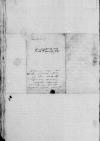Letter #600
Ioannes CAMPENSIS (Jan van CAMPEN) to Ioannes DANTISCUSLeuven (Lovanium), 1531-03-07
| received Brussels, [1531]-03-08 Manuscript sources:
Prints:
| ||||||||||||||||||||||||||
Text & apparatus & commentary Plain text Text & commentary Text & apparatus Excerpts concerning Dantiscus' travels
Viro modis omnibus clarissimo, domino
Salutem quantum vis, praesulum decus.
Fui ab annis non paucis videndi tui tam cupidus, quam numquam tota vita mea hominis alicuius. Cupiditatis huius primus auctor mihi fuit vetus et fidus amicus dominus Letters, the main figure of the Acts of the ApostlesLetters, the main figure of the Acts of the Apostles
Ita me amor tui finem facere sinit ut vix nomini meo subscribendo sit locus, tuus modis omnibus Ioannes Campensi Campensis on the margin⌈Ita me amor tui finem facere sinit ut vix nomini meo subscribendo sit locus, tuus modis omnibus


 UUB, H. 154, f. 47r
UUB, H. 154, f. 47r